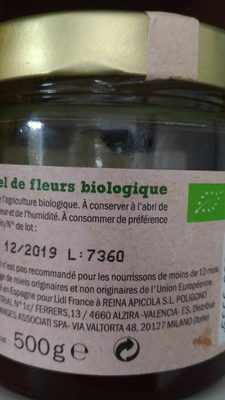Miel de fleur BIO - Maribel - 500g
Ambiguous barcode: This product has a Restricted Circulation Number barcode for products within a company. This means that different producers and stores can use the same barcode for different products.
×
This product page is not complete. You can help to complete it by editing it and adding more data from the photos we have, or by taking more photos using the app for Android or iPhone/iPad. Thank you!
×
Barcode: 20685553
Common name: Miel de fleurs biologique
Quantity: 500g
Brands: Maribel
Categories: Breakfasts, Spreads, Sweet spreads, Bee products, Farming products, Sweeteners, Honeys
Labels, certifications, awards:
Organic, EU Organic, Non-EU Agriculture, ES-ECO-020-CV, EU Agriculture, EU/non-EU Agriculture, Green Dot

Origin of ingredients: European Union, Non European Union
Manufacturing or processing places: Espagne
Stores: Lidl
Countries where sold: France
Matching with your preferences
Environment
Carbon footprint
Packaging
Transportation
Labels
Report a problem
Data sources
Product added on by khorkaadren
Last edit of product page on by roboto-app.
Product page also edited by bancomichel, kiliweb, naruyoko, openfoodfacts-contributors, packbot, yuka.UzdnNURiOFFxdVUxcC9BQ3dCZlcvdmhVNUllM1FXcXdFdG9WSVE9PQ, yuka.WUpJRVFJZ2srdWdua2YwNzJFUEo0SXh3NFlhcVhHQ1pNZEVXSVE9PQ.









